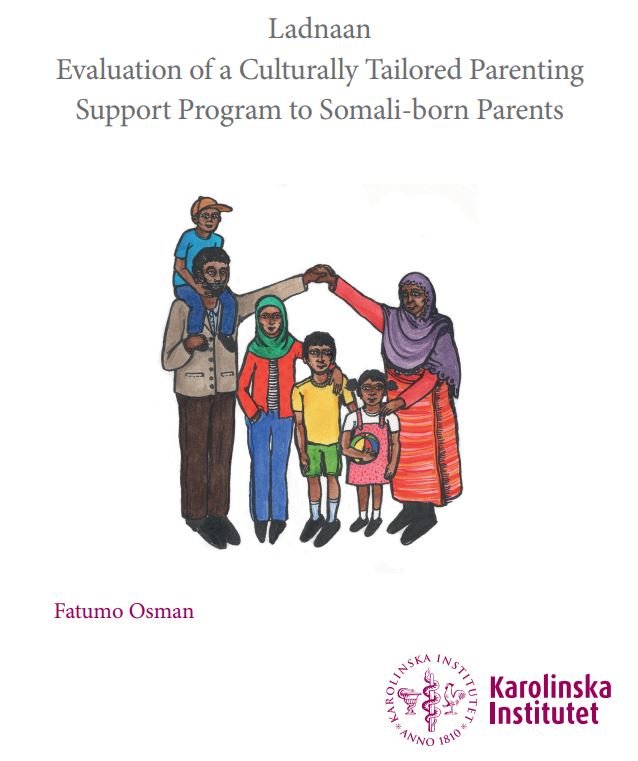
Connect for Somalian Families
Connect for Immigrant Parents Living in Sweden
Background: Research shows that immigrant families encounter different complexities and challenges in a new host country, such as acculturation, isolation and lack of social support. These challenges have been shown to have negative impacts on immigrant families’ mental and emotional health, family function, parenting practices and parents’ sense of competence. Parental support programmes have been shown to positively affect parental skills, strengthen the parent-child relationship, and promote the mental health of parents and children. However, universal parenting support programmes face challenges in reaching and retaining immigrant parents. In addition, there is limited knowledge on the effectiveness of parenting support programmes among immigrant Somali-born parents and their children.
Aim: The overall aim of this thesis was to develop and evaluate the effectiveness of a culturally tailored parenting support programme (Ladnaan intervention) on the mental health of Somali-born parents and their children. A further aim was to explore the parents’ experience of such a support programme on their parenting practises.
Methods: The study involved an RCT study in which 120 parents with children aged 11–16 years, and parents with self-perceived stress relating to their parenting were randomised to an intervention group or a wait-list control group. The Ladnaan intervention consisted of three components: societal information (two sessions), the Connect parenting programme (10 sessions), and a cultural sensitivity component. The Ladnaan intervention was delivered in the participants’ native language by group leaders of similar background and experience, and modifying the examples and role plays in the Connect programme. The primary outcome was a reduction in children’s emotional and behavioural problems as measured by the Child Behaviour Checklist 8-16. The secondary outcomes were improved mental health among parents, as assessed by the General Health Questionnaire (GHQ12); and greater sense of parenting competence, as measured by the Parent Sense of Competence (PSOC) scale. Parents who participated in the intervention were interviewed about their experiences of participating in a culturally tailored parenting support programme.
Results: The results from the RCT showed that, according to the parents’ self-reports, children in the intervention group showed significantly decreased aggressive behaviour, social problems, attention problems, externalising of behavioural problems, and in total problems at the two-month follow-up. Moreover, parents in the intervention group showed significantly and clinically improved mental health and sense of competence in parenting at the two-month follow-up. The improved mental health of the parents could, in part, be explained by their satisfaction in parenting. In study III, parents who participated in the culturally tailored intervention programme reported that it enhanced their confidence in parenting and contributed to their ability to become emotionally aware and available for their children. The parents attributed this to the combination of societal information, the Connect programme, and the cultural sensitivity of the Ladnaan intervention, which were most supportive for their parenting. The culturally sensitive approach of the parenting programme (i.e., conducted in their native language by bicultural and bilingual group leaders) was viewed by the parents as valuable for their participation in the programme, as well as for modifying their parenting practices.
Conclusion: The culturally tailored parenting support programme helped parents overcome transition challenges related to social obligation as parents in the host country, and to modify their parenting orientation and styles in the new country. Furthermore, it improved the parents’ mental health and sense of competence in parenting, as well as reduced their children’s behavioural problems. When tailoring and delivering a parenting support programme to immigrant parents it is crucial to consider their specific needs and preferences and to ensure that the programme is culturally sensitive. Such an approach is more likely to contribute to participants’ engagement, retention, and acceptance of the parenting programme; and also improve their parenting practices and strengthen parent-child relationship, leading to improvements in children’s behaviour and parents’ mental health.
Connect with Somalian Families – Research & Evidence
2017
Osman, F., Salari, R., Klingberg-Allvin, M., Schon, U., K., Flacking, R., (2017). Effects of a culturally tailored parenting support programme in Somali-born parents’ mental health and sense of competence in parenting: a randomised controlled trial. BMJ Open, 7. doi:10.1136. Click here
Osman F., Flacking R., Schön U., Klingberg-Allvin M., (2017). A support program for Somali-born parents on children’s behavioral problems. Pediatrics, doi: 10.1542/peds.2016-2764.
Click here
2016
Osman, F., Klingberg-Allvin, M., Flacking, R., Schon, U. K., (2016). Parenthood in transition – Somali-born parents’ experiences of and needs for parenting support programmes. BMC International Health and Human Righters, 16(7). doi: 10.1186/s12914-016-0082-2. Click here


